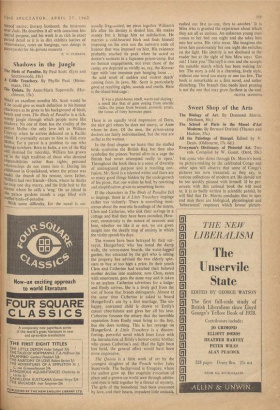Shadows in the Jungle
Wiwi' an excellent novelist Mr. Scott would be if he could give as much definition to his human characters as he gives to his background of birds, beasts and trees. The Birds of Paradise is a rich, wordy jungle through which people move like shadows. No one of them has the vitality of the Parrot Melba—the only love left to William Conway when he arrives defeated on a Pacific island, It eventually occurs to him to dish even Melba, for a parrot is a problem to one who belongs nowhere. Born in India, a son of the Raj 'Ind destined for rulership, William has grown uP in the high tradition of those who demand esponsibilities rather than rights; personal relationships do not come into it. During his childhood in Gopalakand, where the prince was under the thumb of his remote, stern father, William had two friends—Dora, whom he thinks he may one day marry, and the little heir to the throne whom he calls a 'wog.' On an island in the palace gardens stands a cage filled with stuffed birds-of-paradise. With some difficulty, for the novel is un-
usually fragomnted, we piece together William's life after his destiny is denied him. He makes money but it brings him no satisfaction. He marries a cold-hearted bitch and finds himself imposing on his own son the outworn code of honour that was imposed on him. His existence probably reached its peak when he acted as doctor's assistant in a Japanese prison-camp. But no human engagements, not even those of the camp, are depicted as vividly as, say, the Kinwar tiger with 'one immense paw hanging loose . . the acid smell of sudden and violent death' coming from its jaws. Mr. Scott is particularly good at recalling sights, sounds and smells. Here is the island bird-cage:
It was a plant-house smell, warm and cloying: a smell like that of gum oozing from erectile stalks, the juices from bruised, aromatic petals, the fumes of furry hotwater pipes.
There is no equally vivid impression of Dora, the nice girl whom he does not marry, or Anne whom he does. Of the men, the prison-camp doctors are fairly individualised, but the rest are as flat as the women.
In the final chapter we learn that the stuffed birds symbolise the British Raj, but they also symbolise the princes 'buried alive in a cage the British had never attempted really to open.' Throughout the book there is a sense of diversity of unintegrated purpose and a resulting con- fusion. Mr. Scott is a talented writer and there are so many good things hidden by the undergrowth of his prose, that one wishes he had, by rewriting and simplification, given us something better.
If the characters in The Birds of Paradise fail to impinge, those in A Little Treachery impinge rather too violently. There is something mon- strous about the neurotic broodings of the sisters, Clem and Catherine, who sink their savings in a cottage and find they have been swindled, How- ever, monstrosity is the nature of neurosis and here, whether we like it or not, we are given insight into the deadly trap of anxiety in which the victim spends his days.
The women have been betrayed by their sur- veyor, Hungerford, who has noted the damp walls, the worm-eaten boards, the water-logged garden, but attracted by the girl who is selling the property has advised the two elderly spin- sters to buy at too high a price. In their youth Clem and Catherine had watched their beloved mother decline into madness; now Clem, eaten with resentment, goes the same way and is taken to an asylum. Catherine advertises for a lodger and Emily arrives.,, She is a lively girl from the sort of home that breeds delinquents. Almost at the same time Catherine is asked to board Hungerford's son by a first marriage. The un- happy, unwanted child is drawn to Emily's casual cheerfulness and gives her all his love. Catherine foresees the misery that the inevitible separation from Emily must bring to the boy, but she does nothing. This is her revenge on Hungerford. A Little Treachery is a discom- forting, powerful novel which loses force with the introduction of Emily's horror-comic brother who causes Catherine's end. Had the light been less lurid, the general effect would have been more impressive.
The Quinta is a little work of art by the youngest daughter of the French writer Jules Supervielle. The background is Uruguay, where the author grew up. Her exquisite evocation of place and a grown-up world seen through adoles- cent eyes is held together by a thread of mystery. The girls of the household 'had been overcome by love, and their hearts, impudent little aniui.als, rushed out first to one, then to another.' It is Mira who is granted the experience about which they are all so curious. An unknown young man comes to her bed one night and she takes him into her arms. His visits recur. She imagines she loves him passionately' but one night she switches on the light. His identity is, not disclosed to the reader but at the sight of him Mira says; 'Get out I I hate you.' The idyll is over and she accepts the suitable match which has been waiting for her. The story is told in a charming, lively style, without one word too many or one too few. The book is remarkable as a. first novel, and rather disturbing. The branch that needs least pruning is not the one that may grow furthest in the end.
°Livia MANNING














































 Previous page
Previous page